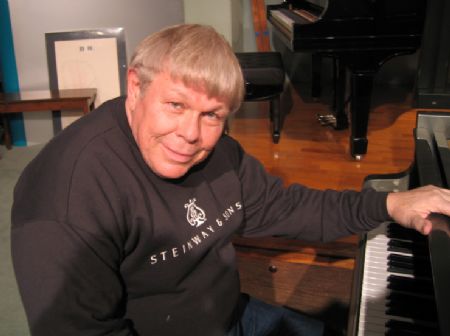|
Symphony
MYSTICAL PLANETS AND LIVELY GERSHWIN ORTIZ AT FINAL SRS CONCERT
by Peter Lert
Sunday, May 4, 2025
Symphony
VSO'S CONCERT MUSIC OF TIME, MUSIC OF PLACE
by Peter Lert
Sunday, April 27, 2025
Choral and Vocal
VOCAL ELEGANCE AND FIRE AT THE 222'S RECITAL APRIL 26
by Pamela Hicks Gailey
Saturday, April 26, 2025
CANTIAMO SONOMA SINGS AN INSPIRED GOOD FRIDAY MOZART REQUIEM CONCERT
by Pamela Hicks Gailey
Friday, April 18, 2025
DRAMATIC SHOSTAKOVICH SYMPHONY CLOSES PHILHARMONIC'S 25TH SEASON
by Terry McNeill
Sunday, April 13, 2025
LARGE COLLEGE OF MARIN AUDIENCE GREETS STOPHER ARTISTRY
by Terry McNeill
Saturday, April 5, 2025
Chamber
FRISSON DELIVERS SHIVERS OF DELIGHT
by Abby Wasserman
Sunday, March 30, 2025
OLD AND MOSTLY NEW IN SRS MARCH CONCERT IN WEILL
by Peter Lert
Saturday, March 22, 2025
Symphony
TWO FORMIDABLE SYMPHONIES AND PURPLE MOUNTAINS AT SRS CONCERT
by Peter Lert
Sunday, February 23, 2025
Chamber
THE PARKER CAPTURES DEMANDING ADES QUARTET AT RAC SEBASTOPOL CONCERT
by Peter Lert
Saturday, February 15, 2025
|
 |
WARM-UP HAS A FEW COLD SPOTS
by Terry McNeill
Thursday, September 25, 2008
Pianist Kenn Gartner is not an artist who makes small statements. In his Aug. 31 recital with soprano Margo-Sherelle Alexander at Guerneville’s Russian River Conservatory, he produced lots of disparate sound, including enough volume to compete with the Labor Day Weekend celebrations at adjacent properties.
Produced by Conservatory Director Seth Montfort, the concert was a warm-up for Gartner and Alexander’s upcoming appearance in San Francisco’s Herbst Theater. The duo’s program, presented to a small audience, featured rarely performed music, such as Wagner’s Wesendonk Lieder, a lush set of five poems set by Wagner in 1857. At the time, he was living in Zurich and had composed “Das Rheingold” and much of “Tristan.”
The haunting “Der Engel” set the tone for the set, with Alexander’s warm lower register and wide vibrato just right for the voluptuous music. Unfortunately, Gartner was too loud throughout, swamping the vocal line in the dramatic “Stehe Still” and during the “Tristan”-like harmonies of “Im Treibhaus.” In the latter, Alexander played off the dissonances from the piano and moved to “Schmerzen” with a beginning forte of considerable power. The beauty of the concluding “Traume” was again hampered by the piano covering Alexander’s voice at the ends of phrases, the held notes at the coda not sounding. It was an odd performance, passionate yet never a convincing whole.
The conservatory’s piano is far below even modest professional standards, an inadequacy that affected Gartner’s solo performances. The first selections, a lyrical Prokofiev work and the rhythm-driven Toccata (1934) of Khachaturian, demanded brilliant playing and received it in large doses from Gartner’s powerful fingers. Even in the Toccata’s colorful mid-section, leading with a big sforszando to the ending, one could sense the pianist wrestling with the “beast” in the small grand.
In the more subdued seventh Nocturne of Chopin (Op. 27, No. 1) and especially with Respighi’s Nocturne, Gartner displayed a poetic touch missing elsewhere. The Respighi had the long line and the essence of a tone poem. There was a puzzling pause in the middle section and overemphasis in the mazurka-like ending, but the reading had heft. Respighi’s piece, arguably his best piano work, reminded one of the best current composers of nocturnes, Lowell Lieberman. Lovely playing.
Alexander then returned to sing “Porgi Amor” from “The Marriage of Figaro,” an aria from “Adriana de Lecouvreur,” and “Summertime” from “Porgy and Bess.” There was palpable tenderness in the Mozart, and Alexander’s delivery of “Summertime” reminded one of Leontyne Price. Praise can go no higher. But it was the dramatic pathos and forte ending in the aria from “Adriana” that produced Alexander’s finest singing. The low tessitura suited her voice splendidly, and with damper pedal held down, Gartner equaled the singer’s nearly orchestral sound. The audience response was effusive.
Concluding the day was a performance of Liszt’s 12th Rhapsody and encores of spirituals and “Art is Calling Me” from the 1911 musical “The Enchantress” by Victor Herbert. The Liszt work received a messy reading, Gartner catching the mercurial changes of mood and a Magyar charge to rout the enemy, but with many wrong notes, muddy textures, and overly long tremolos. He has strong hands and can mount effective interlocking octaves and two-note double-third slurs when needed, but ultimately the poor piano could not accept the pounding and the result was more bombast than even the Weimar master intended. In the Herbert, the large tempo fluctuations and the waltz character were elegantly sung.
The Alexander-Gartner duo doesn’t shy away from demanding repertoire or forceful interpretation, and the coming San Francisco concert with a better piano and brighter acoustical resonance should bring a better result.
|

